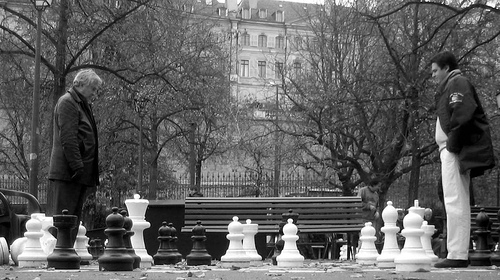We run our website the way we wished the whole internet worked: we provide high quality original content with no ads. We are funded solely by your direct support. Please consider supporting this project.
Does The Open View Limit God?
Suppose you and I both agree that God is omniscient and thus knows all of reality, but we disagree over, say, the number of trees on a certain plot of land. I say there are 1,300 and you say there are 2,300. You wouldn’t say that I am limiting God because he knows fewer trees in my view than he knows in your view. For the issue, of course isn’t about God’s knowledge at all; it’s about how many trees there are on this plot of land.
This illustrates precisely what is going on regarding the openness debate. The issue is not about God’s knowledge at all. Everyone agrees he knows reality perfectly. The issue is the content of the reality God perfectly knows—how many things and what kind of things there are on the “plot of land” we call the future.
If everything in the land of the future is settled, then we must all grant that God would perfectly know this. But if there are fewer things in the land of the future that are definite and more things that are possible, then we must grant that God would perfectly know this. It would be illegitimate for the former group to accuse the latter group of limiting God on the grounds that they deny some “definite realities” in the future. So too, it would be illegitimate for the latter group to accuse the former group of limiting God on the ground that they deny some “possibilities” in the future. The issue is not about the scope or perfection of God’s knowledge at all!
Many evangelicals have accused open theists of limiting God by denying that he foreknows the future as exhaustively settled because they assume that the future is exhaustively settled. If this assumption is granted, then of course anyone who denied that God foreknew the future as exhaustively settled would be limiting God. But open theists do not share this assumption. The accuracy of the classical assumption that the future is exhaustively settled needs to be examined in the light of Scripture (Something I’ve done in God of the Possible and Divine Foreknowledge: Four Views.) Construing this issue as a debate about the perfection of God’s knowledge only serves to cloud the issue and instills fear in the minds of people.
Instead of limiting God, the open view actually depends upon the infinite intelligence of God. We might imagine God as something like an infinitely intelligent chess player. I am told that the average novice chess player can think ahead three or four possible moves. If I do A, for example, my opponent may do B, C, or D. I could then do E, F, or G, to which he may respond with H, I, or J. By contrast, some world-class chess masters can anticipate up to thirty combinations of moves. Now consider that God’s perfect knowledge would allow him to anticipate every possible move and every possible combination of moves, together with every possible response he might make to each of them, for every possible agent throughout history. And he would be able to do this from eternity past.
Isn’t a God who is able to know perfectly these possibilities wiser than a God who simply foreknows or predetermines one story line that the future will follow? And isn’t a God who perfectly anticipates and wisely responds to everything a free agent might do more intelligent than a God who simply knows what a free agent will do? Anticipating and responding to possibilities takes problem-solving intelligence. Simply possessing a crystal ball vision of what’s coming requires none.
—Adapted from God of the Possible, pages 125-128
Category: Q&A
Tags: Calvinism, Divine Foreknowledge, Future, God of the Possible, Open Theism
Topics: Attributes and Character, Responding to Objections
Related Reading

Podcast: Is Open Theism Growing in the World?
Greg discusses the place of Open Theism in contemporary Christianity. http://traffic.libsyn.com/askgregboyd/Episode_0149.mp3

The End and Beginning of Faith
Eduardo Amorim via Compfight Micah J. Murray shared the story of how his doubts and loss of faith led him to a truer, deeper faith. While we fear the doubts that sometimes sneak in, sometimes those doubts lead us to a place of goodness. Be not afraid. From Micah’s story: Eventually I gave up on…

In light of Einstein’s conclusion that time is relative, how can you believe that God is not above time?
Relatively Theory basically stipulates that whether an event is viewed as being in the past, present or future depends on where one is in relation to the event in question as well as how fast one is moving. Some people conclude from this that Relativity Theory lends support to the classical view of God in…

Predestination: What Does It Mean?
When some people hear the biblical teaching that God “chose us in [Christ] before the foundation of the world” (Eph 1:4) and that “he predestined us for adoption to sonship through Christ,” (Eph 1:5) they think it means that God picked who would and would not be in Christ before the foundation of the world.…

What is the significance of Jeremiah 42:9-16?
Through Jeremiah the Lord tells Israel “If you stay in this land, I will build you up and not tear you down; I will plant you and not uproot you, for I have relented concerning the disaster I have inflicted on you” (vs. 10). Then, a few verses later, he says, “However, if you say,…


